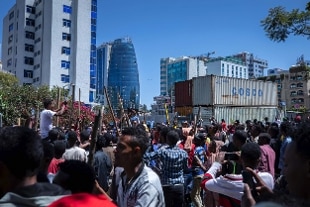- Ethiopia. Premier: foiled coup in the north of the country, several officers killed. Internet obscured
- Double attack on the leaders of Ethiopia and Zimbabwe. Illesi
- Ethiopia, attack on a rally in Addis Ababa. Over 80 wounded: "The goal was the premier"
- Nobel Peace Prize to Ethiopian Prime Minister Abiy Ahmed Ali
Share
by Tiziana Di Giovannandrea 25 October 2019It is at least 67 dead on the scale of the clashes and ethnic violence in Ethiopia, in protests against Prime Minister Abiy Ahmed, who won this month the Nobel Peace Prize.The clashes followed protests that began two days ago, Wednesday, when supporters of the opposition leader, Jawar Mohammed , took to the streets and burned tires and set up barricades, blocking roads in several cities in the country.
To start the protests is the accusation against the Police - which denies - of wanting to remove the escort service to Jawar Mohammed in order to weaken it against a possible attack by political opponents.
The protests started from the capital Addis Ababa and then spread to the Oromia region, where there were deaths in the city of Adama. One person would also have died during the clashes in the ancient city of Harar. The heavy budget has led Jawar Mohammed to accuse Prime Minister Abiy Ahmed of acting as a "dictator".
The Ministry of Defense announced the deployment of soldiers in seven areas where the situation remained particularly tense.
Mohammed, journalist and founder of the opposition media group, Oromia Media Network (OMN), is a former ally of reformist Prime Minister Abiy. Both belong to the Oromo community, the largest ethnic group in Ethiopia.
Relations between the two, however, have recently deteriorated, Jawar Mohammed has publicly criticized several reforms by Abiy Ahmed, in office since April 2018, who has just received the Nobel Peace Prize for his efforts to achieve peace and international cooperation and for wanting to resolve the conflict with Eritrea.
Abiy Ahmed , after coming to power in 2018, began to introduce political and economic reforms. His reforms, however, favored the emergence of ethnic, social and territorial claims by groups that consider themselves under-represented.
Jawar Mohammed, who returned from the United States a little over a year ago, is among the founders of the 'Qeerroo' movement, consisting of oromo, who was in the front line in the mobilizations that led to the fall of the government of Hailemariam Desalegn, the predecessor of Abiy Ahmed.

